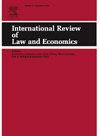诉讼中的相互乐观与风险偏好
IF 1
3区 社会学
Q3 ECONOMICS
引用次数: 0
摘要
为什么有些法律纠纷不能解决?从鸟瞰的角度来看,文献提供了两类原因。一个是基于信息差异的论点。另一种是心理争论。本文对心理学理论进行了探讨。它提出了一个由风险偏好驱动的诉讼模型,并考察了该模型对审判和和解的影响。该模型为诉讼的相互乐观模型奠定了前景理论的基础。研究了该模型对原告胜诉率、和解模式以及与风险规避程度相关的信息不对称的影响。本文章由计算机程序翻译,如有差异,请以英文原文为准。
Mutual optimism and risk preferences in litigation
Why do some legal disputes fail to settle? From a bird’s eye view, the literature offers two categories of reasons. One consists of arguments based on informational disparities. The other consists of psychological arguments. This paper explores the psychological theory. It presents a model of litigation driven by risk preferences and examines the model’s implications for trials and settlements. The model suggests a foundation in Prospect Theory for the Mutual Optimism model of litigation. The model’s implications for plaintiff win rates, settlement patterns, and informational asymmetry with respect to the degree of risk aversion are examined.
求助全文
通过发布文献求助,成功后即可免费获取论文全文。
去求助
来源期刊
CiteScore
2.60
自引率
18.20%
发文量
38
审稿时长
48 days
期刊介绍:
The International Review of Law and Economics provides a forum for interdisciplinary research at the interface of law and economics. IRLE is international in scope and audience and particularly welcomes both theoretical and empirical papers on comparative law and economics, globalization and legal harmonization, and the endogenous emergence of legal institutions, in addition to more traditional legal topics.

 求助内容:
求助内容: 应助结果提醒方式:
应助结果提醒方式:


